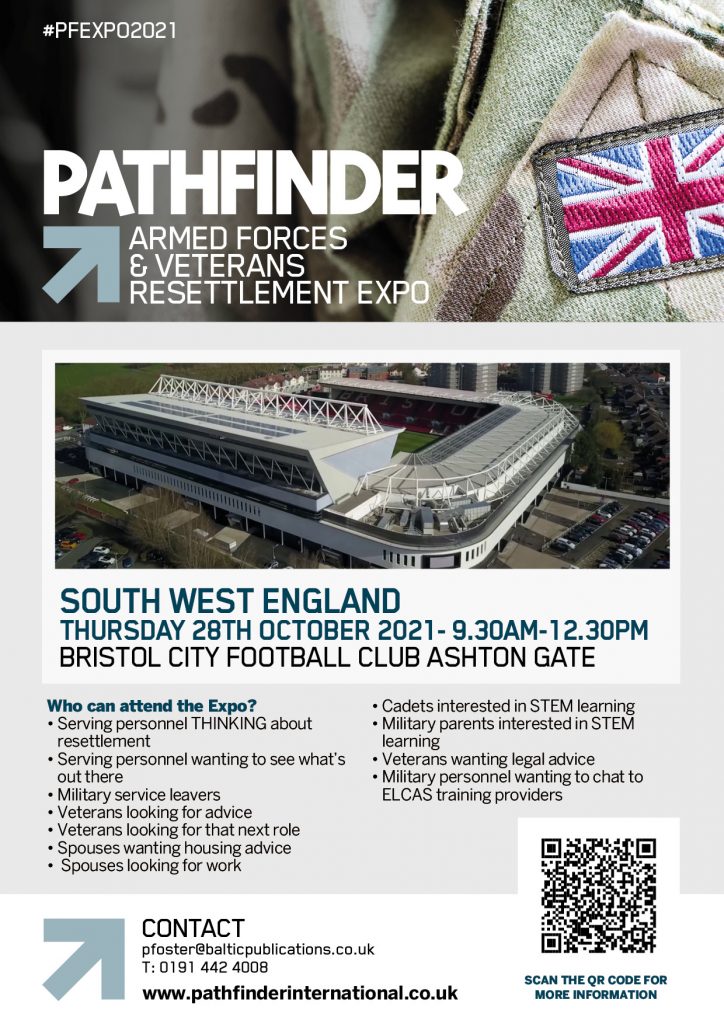
In advance of Pathfinder’s Armed Forces & Veterans Resettlement Expo on Bristol on October 28 (Register for FREE HERE!) we have digitally published the superb monthly column from the Officers’ Association, this issue on the subject of the importance of networking…
Talk to anyone about finding your first or next civilian role and inevitably, networking is mentioned, but what do we mean by ‘networking’, and how should you set about doing it?

Laura Blair, OA’s Director of Employment, outlines why networking is an essential part of your job search journey.
‘Networking’ is often raised as an essential job seeking tool as soon as you consider a civilian career. The word fills most of us with dread because it can be difficult to know what it involves. But does networking really matter? In a nutshell, yes! So, how can you network effectively to impact your civilian job outcomes?
What is networking?
Before getting started, we need to be clear on what networking is. There are several misunderstandings around the topic; it is neither ‘schmoozing’ nor asking lots of people for job opportunities until somebody says yes. Instead, think of networking as building a group of contacts that can help you through the different stages of your career journey.
There are three parts to networking:
- Identifying potentially helpful people
- Communicating with these people
- Unlocking opportunities.
Fortunately, with access to the Internet, social media and informal networking groups, it has never been easier to achieve all three.
Why network?
There are so many reasons to network. It can shorten your job search and help you discover roles suitable for your skills and experience. Networking will also increase your visibility amongst people who can help you access the ‘hidden job market’.
In addition, networking enables you to actively build your next career, rather than passively applying for jobs and hoping for the best. Put simply, the more people you know, the more people you can engage to help and support you. And thanks to the Internet and veterans’ groups, there are already people looking to help you build a network.
Sam Tillotson, a former Army Major who now works for the Bravo Group, says: “Networking is the most valuable way to spend your time. While it may not lead directly to a job, it will help you identify the right sector, the right entry level, and the right company culture for you to approach. It’s equally valuable in helping you find out where not to apply too!”
How to get started
You already have! Everyone has a network: your friends, family, colleagues and associates all count and they all want to help you succeed. So talk to them about your career plans and listen to their advice. They may even be able to introduce you to valuable contacts or recommend organisations.
Many organisations can assist military personnel and veterans with building their civilian careers. For example, the Officers’ Association has Career Consultants who can help with everything from industry advice to interview guidance. You can find and contact many of these organisations via the Veterans Gateway.
Meeting people online has become increasingly acceptable, especially since COVID-19. LinkedIn is the most popular business social network and the perfect place to find contacts. You will need to create a profile, learn how to ‘civilianise’ your military experience and know-how to approach people. There are many guides and tutorials online to help you with this and at the OA, we run training workshops aimed at getting you to speed on LinkedIn.
When you have identified the organisations you would like to work for, go to their LinkedIn page and find their list of employees to contact. However, do not message everyone. Instead, aim to message employees who are also veterans as they are more likely to help and can share insights from their career journey.
Of course, now that in-person employment and industry events are happening again, you can register to attend these, but as they take up more time and effort than online activities, do consider what you want to achieve from the event before signing up.
First contact
Before you contact someone, know what you want to achieve but be realistic about what you’re asking from them. Asking people for paid opportunities, for example, puts them under immediate pressure given they have not yet met you. If there are no immediate positions available, your burgeoning relationship is starting on a negative footing. Ask instead for an informal meeting to discuss their work to learn how to get started in that sector?
If they agree to meet – either in-person or via Zoom – then treat it like a job interview. You want to appear professional, enthusiastic and willing to learn. Avoid speaking in military jargon and speaking too much about yourself. It is better to ask lots of relevant questions and listen to the answers. Remember, always thank them for their time. Even if the meeting does not lead directly to a work opportunity, the person will have shared valuable insights and contacts that could still pay dividends into the future.
Building meaningful connections takes time, so don’t rush the networking process. Keep in regular contact with people from your network – update them on your progress and ask about their latest developments.
What can you expect?
It is doubtful that someone will offer you a job after just one conversation so be realistic. Often, it is better to consider each interaction as one further step along the road towards building a new career. Gradually, you will gain enough momentum to discover and access better job and career opportunities, which is why you can never start networking too soon.
Networking is not just about meeting someone who can offer you advice and open doors. The whole process is your chance to discover more about yourself, the civilian career you want and how to achieve it. In addition, the best networks are where everyone gives, so consider how you can support people in yours. Does an employer want to employ veterans but is unsure how to communicate with them? Is there someone you served with needs support in their post-military career? Reach out. Never underestimate the impact of small helpful gestures.
What if you feel nervous?
Feeling nervous is normal! Talking to strangers and asking for help does not come easy but it’s why you should first get to know your contacts and talking becomes easier over time. It really is a case of practice makes perfect.
You might also feel nervous about how civilian employers perceive you. If you have spent your whole working life in the Armed Forces, it is natural at times to doubt how your skills and abilities translate into the civilian world. However, you have strong transferable skills which are highly desirable to employers and learning to communicate their value will help you. Again, veteran organisations can assist you in identifying these skills, and communicating your experiences in business-friendly language.
When do you stop networking?
Never is the short answer! You spent a lot of time and resources building your network; why close it once you have secured a job? Maintaining your network could open opportunities within your current role or help you find the next one. You can also use your network to help other veterans and pay back those following in your footsteps.
Whatever career path you choose, networking will help get you there. Remember, you cannot network alone. Best of luck!
Essential Networking Tips
In summary, here is our advice to networking success:
Start now. It is never too early to begin building your network. Build it before you need it. Plus, growing your network might even help you decide when to leave military life.
Ask friends and family for help. From bouncing ideas to introducing useful contacts, they can be more helpful than you might realise.
Join LinkedIn. Almost everyone in a civilian profession is on LinkedIn. Take the time to build a good profile, find useful contacts and build your network.
Contact veteran organisations. There are several key charities, veteran organisations and military employment groups able to offer employment support.
Treat every conversation like a job interview. Who knows where a conversation might lead? Always present yourself as hardworking, curious and eager to learn. Ask lots of questions instead of talking about yourself.
Feeling nervous is okay. This is a big step so doubts and nerves are to be expected. Try to focus on the opportunities instead. Remember, nobody enjoys talking to strangers but you are contacting people with a clear purpose.
Never stop networking. You really are as strong as your network, so don’t stop building yours. The more useful contacts you have, the more opportunities you can create.
Pay it back. It goes without saying, if people contributed to your success, you should do the same for others. Camaraderie is one of the military community’s greatest strengths and everyone benefits if you apply that mentality to your civilian career.
To find out more about OA’s networking events, visit officersassociation.org.uk.
Register for the Armed Forces & Veterans Resettlement Expo in association with Get Claims Advice – HERE!



